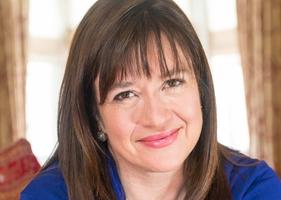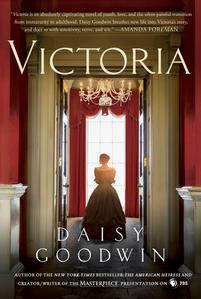
|
|
| photo: Francesco Guidicini | |
Daisy Goodwin is a writer and a television producer, who studied history at Cambridge, then went to Columbia Film School as a Harkness Fellow. After 10 years making arts documentaries at the BBC, she became an independent producer, with credit for several programs, including Grand Designs, which is now in its 18th year.
Goodwin is also the author of two novels, The American Heiress and The Fortune Hunter. She is most recently the author of the screenplay for Victoria, an eight-part series about the life of the young Queen Victoria for PBS's Masterpiece (airing this month), and the companion novel, Victoria (St. Martin's Press).
What inspired you to write about the young Victoria?
I'm a history graduate and I spent a lot of time studying her at college. I was a teenager when I read the diaries that she wrote as a teenager. I expected they would be boring. But they're all about parties and men, basically. She writes that she's coming in from a ride with Albert and he's wearing his white cashmere breeches but there's nothing on underneath. When I read that I thought, "Wow! There's a girl with an eye for detail."
We think of her as she was in later life, as a grumpy old crone. Actually, she was young and passionate and full of excitement. That's what I try to convey in the book.
Was there anything about Victoria that surprised you?
What really amazed me was her incredible sense of who she was and what she wanted to be. She had this very oppressive upbringing where everything had been decided for her. She couldn't do anything. She couldn't even walk down the stairs without assistance. Some people would have come out of that enfeebled. They would have found it hard to adjust--like prisoners coming out of the end of their sentence. Not Victoria! She springs right out of the gate. The first thing she does is change her name [from Alexandrina, or Drina]. She says she wants to be called Victoria. It's a kind of name that no one was called.
And also she's very clear that she doesn't want her mother---the first thing she does when she comes to power is say, "I want to be alone." She pushes her mother and [her mother's favorite] Sir John Conroy out of the way. I find that very interesting in a teenager girl. To be so confident in herself at that age. I have huge admiration for that. She could very easily have been someone who was manipulated by those around her, but she really never was.
It's sometimes overlooked because we think, "Oh, well, she just inherited that." It's more than that. The monarchs before her had been very unpopular. She was coming into a failing institution. The monarchy didn't have the same respect that it does now. And so she had a lot of work to do.
You have a great track record for writing historical fiction with strong central female characters. But Victoria is different because the main character is an actual historical figure. Where do you draw the line between history and fiction?
I spent a lot of time reading her diaries and I feel very connected to her voice. There are bits that I've fictionalized or novelized or whatever you want to call it, but I've only done it when it feels in sympathy with her voice. I wouldn't take her in directions that she wouldn't have gone.
If you read the diaries as a writer rather than as a historian, you can read between the lines. For instance, her relationship with Lord Melbourne is clearly there--I've dramatized it, but if you read the diaries it's clear she was besotted with him. It was her first adult relationship with anyone.  Were there other sources that you depended on in addition to Victoria's diaries?
Were there other sources that you depended on in addition to Victoria's diaries?
I've been working up to this pretty much all my life. I've been a Victoria-phile since I was a teenager. I know the period very well. I've read the biographies. I try to read a lot of contemporary diaries and newspapers in order to get a feel for what people at that time thought rather than what we think in hindsight.
At one point you describe Victoria as the most un-Victorian of heroines.
Yes! Yes! We think of Victorian heroines as rather passive and creeping around in the shadows. But Victoria is very much at the center of things. She's passionate. She's very physically aware. She loves men. She loves sex. She's aware of things you just don't find in Victorian novels. It's not the conventional idea of Victorian women.
Unlike conventional marriage plots, she's the one who does the proposing at the end. It's not Albert. She's the one who has to decide whether she will propose to Albert. It puts our expectations about the Victorian ways of doing things on their head.
Albert is much more Victorian than she is. Throughout her life she's very frank about the physical stuff. When you read the diaries, it's very clear what she thinks about all that. I find it refreshing that she's very uninhibited in that way. And she had nine children.
What's charming is that she and Albert really loved each other. They were very into each other physically. That was a new thing. For royals to dig each other in that way. It really was a love match.
I know you've already done a lot of interviews, is there anything you wish someone would ask you?
I got a question I was embarrassed by. Someone said to me, "Is this a feminist take on Victoria?" It was a man, obviously.
I said, "What do you mean?"
He answered, "Well, you've got a young woman taking control."
Does that mean it's feminist? A true story about a queen?
But now it's come out in England. And when I look at the reaction, I think it does feel feminist because it's written by a woman. I've been asked if it would be different if it were written by a man. And I think it would have been.
I'm very interested in how women deal with power. She is the first--or at least the most famous--woman in a sense to have it all. She's wife, mother and queen. I'm looking at her from that angle. Not just what she does as queen, but how she deals with the rest of her life as well. She didn't compartmentalize stuff. The personal was always political for Victoria. What I love about her is that she never refuses to use her femininity. She never goes, "Oh, I've got to be like a man." She was always herself. I find that very endearing. And I think it's very encouraging that you can have women in power who don't try to be anything other than themselves
I think she's a good role model for young girls. She makes mistakes, but she does so with great courage. She's never passive. She never allows herself to be manipulated. I like that about her.
So it sounds like it is a feminist book at some level.
She's a woman in power. That is a feminist thing.
I'm very interested in how women adjust to positions of power. Unlike a series like The Crown, which is more about an institution that has a woman in it, I'm coming from the character rather than the institution. --Pamela Toler, blogging at History in the Margins

